| Srl | Item |
| 1 |
ID:
065810
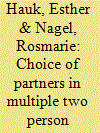

|
|
|
| 2 |
ID:
128977
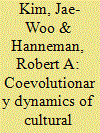

|
|
|
|
|
| Publication |
2014.
|
| Summary/Abstract |
The emergence and institutionalization of cooperation in sizable groups without reciprocity receives considerable attention in game-theoretical modeling. Agents in our study play the Prisoner's Dilemma game cooperating with tolerably similar neighbors. They may imitate cultural markers (tags) and tolerance from more successful neighbors. Alternatively, they break ties to out-group neighbors. New partners are selected either from neighbors' neighbors (clustering) or randomly. Variations in network plasticity (the likelihood of changing partners rather than being influenced) and clustering are explored. With high plasticity and high clustering, networks tend to fragment. With low plasticity and low clustering, networks tend toward global cooperation, but with severe losses of cultural diversity and tolerance. Cooperation in such regimes also proves to be vulnerable to defection. Between, there is a space displaying relatively stable and widespread cooperation with diversity and tolerance. We note some important structural characteristics of the networks evolving in this space.
|
|
|
|
|
|
|
|
|
|
|
|
|
|
|
|
| 3 |
ID:
084031
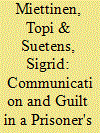

|
|
|
|
|
| Publication |
2008.
|
| Summary/Abstract |
In this article, the authors measure experienced guilt in a prisoner's-dilemma experiment with preplay communication. The authors find that feelings of guilt only arise in the case of unilateral defection and that they are stronger when players have mutually agreed to cooperate. The authors also find that fining unilateral defection reduces feelings of guilt.
|
|
|
|
|
|
|
|
|
|
|
|
|
|
|
|
| 4 |
ID:
100949


|
|
|
|
|
| Publication |
2010.
|
| Summary/Abstract |
This study presents an analytical model of budget allocation into military and civilian expenditures within an arms race between two rival countries and compares the consequences of shortsighted (period-by-period) planning versus forward-looking (long-term) planning. The authors show that although shortsighted planning is favorable for both countries, they are likely to be locked in a prisoner's dilemma in which both overinvest in arms procurement. The likelihood of overinvestment in arms procurement is higher when the perceived benefit from security is higher and when future benefits from existing arms stocks are ''high''; that is, when the rate of technology improvement over time is lower, the depreciation rate of existing arms is lower and the discount factor is higher. A dynamic version of Kagan et al., employing real-world data, finds evidence for the existence of a prisoner's dilemma in the Israeli-Syrian arms race.
|
|
|
|
|
|
|
|
|
|
|
|
|
|
|
|
| 5 |
ID:
131259
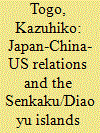

|
|
|
|
|
| Publication |
2014.
|
| Summary/Abstract |
In this analysis of the Senkaku/Diaoyu, including the US role, I employ the framework of Western theories of international relations (IR). The analysis turns to the prisoner's dilemma to find a possible solution to the present impasse. The key task for negotiators and IR theorists is to find an equation that satisfies three factors simultaneously: China does not enter Japan's territorial waters; Japan continues the three nos of "not to land, not to investigate, and not to build"; and confidence-building measures are instituted to avoid direct military collisions. So far, the prisoner's dilemma has not succeeded in finding that equation, so perhaps more attention should be paid to the Eastern concept of face saving or giving face, which in addition to the other three factors might enable the two sides to reach a modus vivendi.
|
|
|
|
|
|
|
|
|
|
|
|
|
|
|
|
| 6 |
ID:
068732
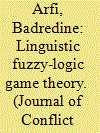

|
|
|
| 7 |
ID:
169395
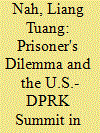

|
|
|
| 8 |
ID:
091616
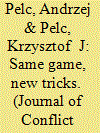

|
|
|
|
|
| Publication |
2009.
|
| Summary/Abstract |
The aim of this article is to distinguish between strategies in the Iterated Prisoner's Dilemma on the basis of their relative performance in a given population set. We first define a natural order on such strategies that disregards isolated disturbances, by using the limit of time-average payoffs. This order allows us to consider one strategy as strictly better than another in some population of strategies. We then determine a strategy-to be ''robust,'' if in any population consisting of copies of two types of strategies, itself and some other strategy - the strategy - is never worse than. We present a large class of such robust strategies. Strikingly, robustness can accommodate an arbitrary level of generosity, conditional on the strength of subsequent retaliation; and it does not require symmetric retaliation. Taken together, these findings allow us to design strategies that significantly lessen the problem of noise, without forsaking performance. Finally, we show that no strategy exhibits robustness in all population sets of three or more strategy types.
|
|
|
|
|
|
|
|
|
|
|
|
|
|
|
|